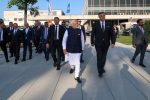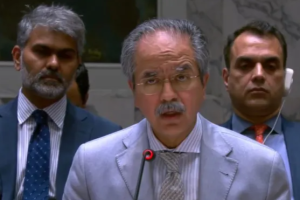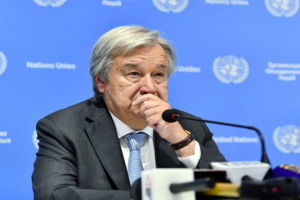The head of the Nobel Peace Prize-winning World Food Program sounded an alarm Wednesday that war-torn Yemen faces “looming famine” and urged nations to provide hundreds of millions of dollars immediately, saying it will mean “the difference between life and death of millions of Yemenis.”
David Beasley told the UN Security Council that, according to the latest UN internal analysis, “famine is truly a real and dangerous possibility and the warning lights are flashing, and they”re not flashing yellow, they”re flashing red — as red can be.”
“We”re on a countdown right now to a catastrophe in Yemen,” he said. “If we choose to look away, there”s no doubt in my mind Yemen will be plunged into a devastating famine within a few short months.”
Yemen”s conflict started with Houthi Shiite rebels, backed by Iran, capturing Sanaa, the capital, in 2014, forcing the internationally recognized government to flee.
The following year, a Saudi-led coalition supporting the government intervened to battle the rebels and curb Iran”s influence in what has turned into a stalemated regional proxy war. Since then, more than 100,000 people — fighters and civilians — have been killed.
Beasley said 9 million of the 13 million people the World Food Program is assisting — mainly in northern areas controlled by Houthi rebels — have already had their food aid cut from every month to every other month, and the agency is running out of money.
“Come January, we are going to have to cut rations additionally for 6 million people, and we will run completely out in March, and I cannot begin to tell you the catastrophe that will be,” he said.
Besides appealing for urgent new funds, Lowcock implored donors to turn more than $200 million in pledges into cash.
On Sept. 15, Lowcock for the first time singled out Saudi Arabia, the United Arab Emirates and Kuwait for giving nothing to the 2020 appeal. Days later, Kuwait announced a $20 million donation and Saudi Arabia publicly committed to providing $204 million to U.N. aid agencies, part of its $500 million pledged in June.
The UAE, which was part of the Saudi-led coalition and had been a top donor, did not announce any funding for this year. Germany”s U.N. Ambassador Christoph Heusgen called on its leaders Wednesday to respond to the U.N. appeal.
Lowcock described in graphic detail “the horrors inflicted by famine on the body and on the soul,” saying as they starve people, especially children, are likelier to fall sick or die from diseases they may otherwise have resisted. For those who escape disease and find nothing to eat, he said, vital organs start to wither and “the body starts to devour its own muscles, including the heart.”
“It is the fate the world has left hanging over millions of Yemeni men, women and especially children,” he said. “Yemenis are not ”going hungry”, They are being starved.”
Two years ago, WFP”s Beasley told the council, “nations of the world stepped up and we were able to pull back from the brink of famine … and that means we saved lives.” He said “unnecessary obstructions” by the Houthis are partly responsible for the current crisis.
WFP has spent nearly two years negotiating with the rebels about access to areas they control and monitoring systems to ensure that aid gets to those in need, which donors expect in return for their taxpayer dollars, he said. With competition for aid, including for the coronavirus pandemic, the Houthis were told that “the last thing we need is these kind of games,” he said.
Beasley reported “a glimmer of hope” with the Houthis agreeing Sunday to a pilot project on biometric registration for 150,000 beneficiaries in Sanaa. But he said the Houthis still haven”t met five of the seven conditions set out by donors in February.
He said he hoped Houthi authorities would work with WFP to meet the criteria, which would also help stabilize Yemen”s worsening economy.

























Add Comment